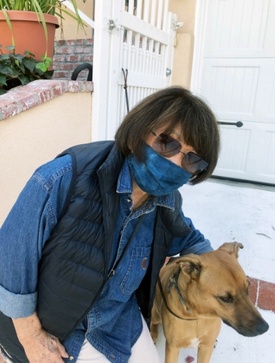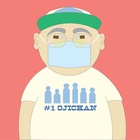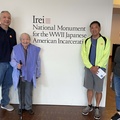What began last March as a few months of social distancing has now turned into the prospect of long-term isolation as COVID19 increases at a staggering rate. As a proud member of the senior population considered “high risk,” I can personally attest to the stresses and strains of home confinement.
Perhaps the greatest deprivation has been the loss of social interaction except for who we can see on a phone or computer screen — with Skype, FaceTime, and Zoom becoming regular activities, not to mention rising to Webster dictionary status of actual verbs. I still yearn for the social connections that come with in-person contact and long for even the smallest exchanges with real live human beings.
I decided to turn to some JANM volunteer seniors, some of the busiest high-risk seniors I know, to get some idea of how they’re coping with not being able to take their weekly all-day trips to the museum to sit through meetings, lunches, and just plain hanging out.
Much to my surprise, the ones I asked are doing just fine. Perhaps it’s Nisei gaman that helps them cope, but I got the sense that there’s actually a lot to love about staying at home. Take, for example, June Aochi Berk, the liveliest 88-year-old I know. She is really enjoying the newfound luxury of being sequestered at home.
After 30 years living in the same house, she is now just getting to know her immediate surroundings as she takes her daily walks through her neighborhood with her trusty Rhodesian Ridgeback sidekick, Annie, who always manages to make her smile. And she’s even gotten to know a few of her neighbors.
As long as she has her computer and phone, she’s armed for volunteer duty. Rather than driving to perform her weekly jobs at JANM, Sakura Gardens, and Koreisha, June says, “I opened my big mouth” to take on the overtime job of helping put together the annual JANM Kokoro boutique from the comfort of her home. Buyers and sellers are also enjoying the benefits of at-home virtual shopping. (For the full selection of goodies, the catalogue can be found online, and there’s a YouTube video that June put together with fellow volunteers that makes the event come alive).
June turned her crazy idea into a true labor of love with the rewards far outweighing the endless number of hours she put in to make this happen. After discovering the stories behind the artistry of many of the craftspeople who were yearly sellers at the annual Kokoro event, she became fascinated with the spirit behind the work, and is now working on writing up some of the fascinating histories she gleaned about how they came to hone their crafts.
Another JANM volunteer who is coping just fine with staying at home is 87-year-old Richard Murakami, not that he doesn’t miss seeing everyone on his former three-day-a-week trips to JANM. His sole outings at the moment are going to the pharmacy and to Bristol Farms at the 6 a.m. senior hour. Far be it from Richard to complain. “I’m a farmer’s son,” he says. “All day I played by myself, went to school, then played by myself some more.”
Living with COVID reminds him of what his life as a loner was like back then, and he claims he’s used to it. His days are spent tuning in to Zoom events and meetings, as well as watching TV sports. He also loves the vicarious pleasure of traveling to his favorite destination, Japan, by way of NHK programs.
Sharing his household is longtime JANM volunteer, Masako Koga Murakami, who is more forthright in her complaints about the difficulties of being forced to stay at home. Her son and daughter have strategically placed a remote doorbell at her front door to monitor her every move. Once or twice, she was caught red-handed with a bag from the local McDonald’s after she tried to sneak out. She now has to content herself with sitting in the car while her son drives her to Little Tokyo once every other week to pick up fresh produce at Azay.
Seeing the busy streets that she once traveled freely, she realizes, “When you know you can’t do something, that’s what makes it harder.” Nevertheless, she feels it important to support the local restaurants by buying take-out whenever she can. She goes on to say that she’s lucky to have younger JANM friends stop by from time to time to talk to her across her outdoor porch, and that’s enough to give her a much-needed dose of real people contact.
If any of them had to admit to a real downside to their current situation, they would say that the pandemic has made the already difficult aging process worse. If they had to name one thing that made them sad, it would be not being able to say goodbye to friends who’ve died during the past few months. “We’re at the age where people are dying or getting sick,” say both June and Masako, and COVID has heightened awareness of the inevitability of death.
As months pass by quickly and traditional happy holidays come and go, I am reminded of the oft-repeated phrase told me by a non-JA friend who has been known to whine, “I’m 82, wait until you get to be 82” as if his life has already passed him by. Fortunately, I can turn to people like Richard, Masako, and June knowing that there’s a positive way to look at every difficult situation — much like our ancestors did — and that’s enough to make me thankful.
*This article was originally published by The Rafu Shimpo on November 24, 2020.
© 2020 Sharon Yamato / Rafu Shimpo







